|
|
|
Sort Order |
|
|
|
Items / Page
|
|
|
|
|
|
|
| Srl | Item |
| 1 |
ID:
112742
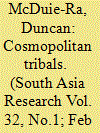

|
|
|
|
|
| Publication |
2012.
|
| Summary/Abstract |
Based on fieldwork, this article examines various aspects of tribal migration from the Northeast frontier of India to Delhi, a phenomenon which increased rapidly in the last half decade or so. This offers insights into four important interlinked processes. First, such migration indicates significant changes taking place in the Northeast itself. While many migrants leave the region to escape conflict, many more simply seek to find work, pursue education and fulfil changing aspirations. Second, tribal migration to Delhi reveals the ways in which the city itself has been changing. While tribal migrants search out employment opportunities in neoliberal capitalist spaces, employers in such spaces have specific reasons to desire tribal labour, particularly in shopping malls and call centres. Third, tribal migrants encounter racism and discrimination in Delhi and their experiences reveal how racial issues function and are debated today within India. Fourth, tribal migrants themselves embody the dramatic discord between the ways tribals see themselves and the ways they are perceived in India.
|
|
|
|
|
|
|
|
|
|
|
|
|
|
|
|
| 2 |
ID:
170173
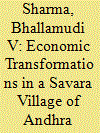

|
|
|
|
|
| Summary/Abstract |
Even tribal communities in India living in relative geographic isolation have experienced significant transformations during the last 70 years. Many studies have investigated the impact of tribal development programmes on the socio-economic conditions of different tribal communities. However, few attempts to systematically re-study the same tribal village after some decades have been made. This article re-examines the transformation of different sources of income for a Savara village in Andhra Pradesh and specifically scrutinises the impact of cashew plantations promoted in 1983–5. Since the acceptance to undertake cashew plantation was a precondition for the Savara of Manapuram to achieve economic and language integration, the question becomes what have been the results after some decades. The article identifies many consequences for this community, not just a shift from tamarind to cashew.
|
|
|
|
|
|
|
|
|
|
|
|
|
|
|
|
| 3 |
ID:
153000
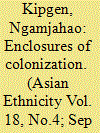

|
|
|
|
|
| Summary/Abstract |
This paper examines the Mapithel dam in Northeastern state of Manipur in India as a site of contestation between the state-led development agenda and the affected tribal people. Based on discursive field experiences, the paper reflects upon the competing values in relation to land use and ownership systems and raises a question – as to whether in the name of development, is the government eroding tribal people’s right over their land and resources? The Mapithel dam issue not only invites serious deliberations beyond dam construction and its social and ecological ramifications but also contemplates on the various dynamics in and through cultural identity, politics, and natural resources. The paper addresses some key aspects of the very political closure approach which emphasizes state’s hegemony through forceful intrusion into the life, livelihood, and ‘lebenswelt’ of tribal people and infringement of their traditional rights.
|
|
|
|
|
|
|
|
|
|
|
|
|
|
|
|
| 4 |
ID:
156526
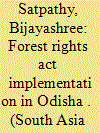

|
|
|
|
|
| Summary/Abstract |
The Forest Rights Act (FRA) 2006 claims to devolve ownership to local forest dwellers in India, to provide local communities with better tenurial security and allow increased rights over forest resources. One argument for this is the redressal of historical injustices, particularly to tribal people. Offering a reality check, this article scrutinises the interface of informal and formal institutions with respect to livelihood of forest-dependent communities and forest conservation to identify ongoing implementation challenges. Empirical data from two villages of Mayurbhanj district in Odisha use oral history, focus group discussions and in-depth interviews with different actors in FRA implementation as evidence. Asymmetric information flow, deficient coordination, undemocratic participation, dearth of transparency and lack of accountability at various levels hinder FRA implementation, which claims to safeguard the basic rights of disempowered local people, but does not appear to deliver ‘complete justice’.
|
|
|
|
|
|
|
|
|
|
|
|
|
|
|
|
| 5 |
ID:
128876
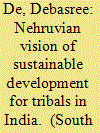

|
|
|
|
|
| Publication |
2014.
|
| Summary/Abstract |
As the first Prime Minister of India, Nehru pursued a policy of rapid industrialisation and national development, largely equated with economic growth and surplus. He once said that dams are the temples of modern India and claimed that big dams would address India's hunger and poverty. However, such development agenda also created much pain and suffering for the owners/users of land sacrificed in the public interest, mostly the indigenous people of India (Adivasis). This article critically analyses the impact of development policies on the Adivasi peoples of India, earlier and today. It argues specifically that Nehru's well-sounding development concept of Panchsheel, the 'Five Pillars of Tribal Development', did not work for the Adivasis and largely ruined their own efforts to secure sustainable development.
|
|
|
|
|
|
|
|
|
|
|
|
|
|
|
|
| 6 |
ID:
091729
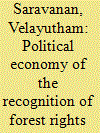

|
|
|
|
|
| Publication |
2009.
|
| Summary/Abstract |
Politics has played havoc with tribals and the environment during the post-Independence period in India. Even after fi fty years of Indian planning, deprived groups, and tribals in particular, continue to remain underdeveloped, with their living conditions deteriorating further. Taking a historical perspective, this article seeks to capture the political undercurrents of economic policy-making towards tribals and tribal development planning and specifi cally analyses the consequences of the Scheduled Tribes and Other Traditional Forest Dwellers (Recognition of Forest Rights) Act of 2006 on the environment as well as tribal development. Examining whether this new, politically motivated law will provide an impetus for economic progress of the tribals and environmental sustainability, it is argued that this Act will neither benefit the tribal communities nor enhance conservation. Rather, it serves as a cloak to justify non-tribal intervention, with potentially disastrous consequences.
|
|
|
|
|
|
|
|
|
|
|
|
|
|
|
|
| 7 |
ID:
180677


|
|
|
|
|
| Summary/Abstract |
This study seeks to counter interpretations of tribal movements as reflecting parochial and perverse ethno-territorial aspirations, mostly in irrational violent forms. It compares two peaceful protest movements against wildlife sanctuaries located in different geographical and political-economic settings in the eastern Indian state of Odisha. As rational collective actions, both movements relied on the agency of project-affected persons who questioned state attempts to de-politicise development in the name of scientific conservation. The study shows how the legitimate concerns of such project-affected citizens were overshadowed by politics and the context-specific dialectical interface between three different factors, namely availability of indigenous organisational resources, political opportunity structures and identity construction.
|
|
|
|
|
|
|
|
|
|
|
|
|
|
|
|
| 8 |
ID:
146876
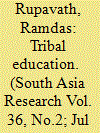

|
|
|
|
|
| Summary/Abstract |
This article critically examines initiatives for greater participation in education by tribal communities in India, arguing that current policy does not effectively enough facilitate greater participation and may, in fact, go against the avowed principle of ensuring greater equity. The article relies on fieldwork-based study to support arguments for the need to be culturally sensitive in making appropriate provisions for the education of scheduled tribes in India. Reasons for high dropout rates and non-enrolment among tribal children are examined and some searching questions are asked about why so many tribal people dislike schools.
|
|
|
|
|
|
|
|
|
|
|
|
|
|
|
|
| 9 |
ID:
090592
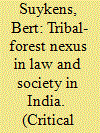

|
|
|
|
|
| Publication |
2009.
|
| Summary/Abstract |
This article examines two conflicting narratives concerning the relationship between tribals and forests in India-narratives that have been counterpoised in India at least since colonial times. The first narrative sees tribals as the natural protectors of the forest; the second argues that tribal practices are detrimental to forest conservation. The author investigates how these two representations of Indian tribals have shaped and are still shaping legal and societal relations between tribals and forests. The author shows how these narratives are deeply embedded in Indian forest legislation and how local officials, rights activists, and tribals themselves all make selective use of the two narratives to gain or deny access to forest resources.
|
|
|
|
|
|
|
|
|
|
|
|
|
|
|
|
|
|
|
|
|